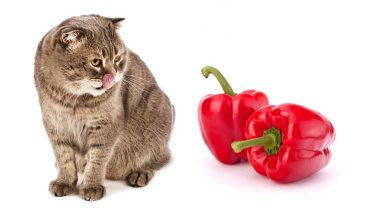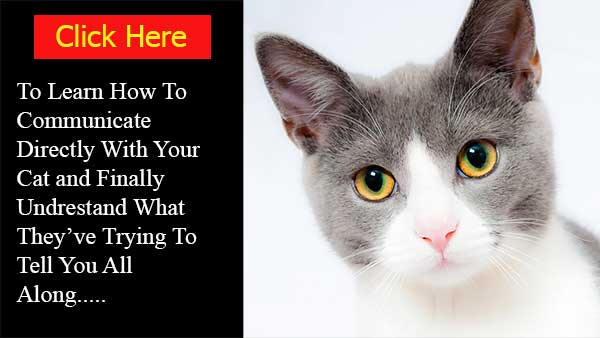Bell peppers are a cultivar group of plants belonging to the species Capsicum annuum.
The term “bell peppers” may often be used interchangeably with “chili peppers.”
However, these two are vividly different in their appearance. But most notably, bell peppers don’t feature the strong and hot taste that chili peppers have.
That’s because they don’t contain any significant levels of capsaicin or capsaicinoids, which explains why they’re often grouped alongside the less-pungent pepper varieties such as the “sweet pepper.”
Bell peppers exist in different colors depending on their stage of ripening. And though they’re typically used as vegetables, bell peppers are actually fruits. Botanically, they belong to the class of berries. Amidst their delectable taste, can cats eat bell peppers?
The short answer is “yes,” you can offer bell peppers to your feline. However, the answer isn’t as cut and dried as it may sound.
Read on for a more insightful view of cats and bell peppers.
Table of Contents
Possible Health Benefits of Bell Pepper
As a pet owner, you may have asked yourself this question at some point – can I give my cat bell peppers?
The first step in settling this question is understanding the possible health and nutritional benefits of bell pepper. The following are some of these benefits.
1. Prevention of anemia
Anemia is a severe condition that affects cats in nearly the same way it affects us.
Anemia symptoms in cats manifest in fatigue, reduced appetite, exercise intolerance, and pale gums. If you don’t seek urgent medical intervention, the disease could result in blood transfusion.
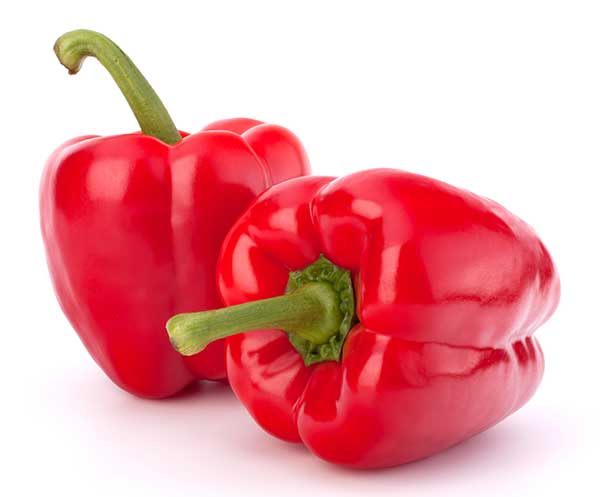
That may be too hard for your cat to bear. Plus, the costs of blood transfusion are often exorbitant. Like many such debilitating conditions, the best way to manage anemia is to prevent it from occurring in the first place.
Thankfully, bell peppers have been shown to lower the susceptibility of cats to anemia. That’s because bell peppers are rich in iron and vitamin C – an excellent anti-anemia combination. Vitamin C not only boosts your cat’s immunity, but it also enhances iron absorption.
To make your cat even less susceptible to anemia, you might consider serving her bell pepper alongside other iron-rich foods such as spinach and meat.
2. Reducing the risks of macular degeneration
Another notable benefit of bell pepper for cats is the reduction of macular degeneration. This especially applies to aging and sickly cats. Bell peppers contain an abundance of essential carotenoids such as zeaxanthin and lutein.
According to this study, these carotenoids have been proven to inhibit macular degeneration. Additionally, they lower the risks of developing cataracts.
A cat’s eyes are some of its most resourceful organs. And losing them can be heart-wrenching for your furry friend. But by occasionally serving foods containing bell peppers to your cat, you can significantly lower the chances of visual impairments.
3. Reducing the risks of cancer
Feline cancers are not uncommon. And just like in humans, numerous types of cancer are linked to a cat’s diet and lifestyle.
Therefore, the preventive and curative remedies must also be focused around the foods our cats eat.
Bell peppers have been shown to contain an abundance of antioxidant compounds. Some of these compounds include zeaxanthin, quercetin, lutein, capsanthin, and luteolin.
The anti-inflammatory properties of these compounds help prevent the proliferation of cancerous cells. Most notably, they’re instrumental for a cat undergoing various forms of cancer treatments, such as chemotherapy and radiation therapies.
Apart from the prevention of cancer, the antioxidants present in bell pepper also help keep heart disease, dementia, and arthritis at bay.

4. Relieving indigestion and dehydration
Bell peppers boast a significant percentage of water content. That is very resourceful for dehydrated cats.
If your feline has gone for days on end without drinking, the chances are that it might already have lost its appetite. Therefore, offering plain water to the cat may not help much.
Instead, you could try bell peppers, since they’re both rich in water content and are reasonably sweet. The cat will savor the delicious taste of the food while seamlessly benefiting from the water in it.
Besides water, bell pepper is an excellent natural source of fiber. Therefore, you can comfortably prescribe it for a cat facing digestive issues, such as constipation and incontinence.
Evidently, the potential health and nutritional benefits of bell peppers are limitless. But still, can cats have bell peppers?
In the next session, we shall highlight the possible risks of offering bell peppers to your feline friend.
Potential Hazards of Offering Bell Pepper to Your Cat
Is it safe for cats to eat bell peppers? Well, so far, the answer to that question is a “yes.”
However, what could possibly go wrong if I offer bell peppers to my cat?
First and foremost, it depends on the amount the cat has eaten. Unless your cat has a strong liking for the fruit, it’s unlikely to consume a full bell pepper.
And even if it happens to gobble down a huge chunk of the fruit, you still don’t need to fret. That’s because bell peppers aren’t toxic at all. Indeed, they don’t constitute the list of dangerous human foods for cats.
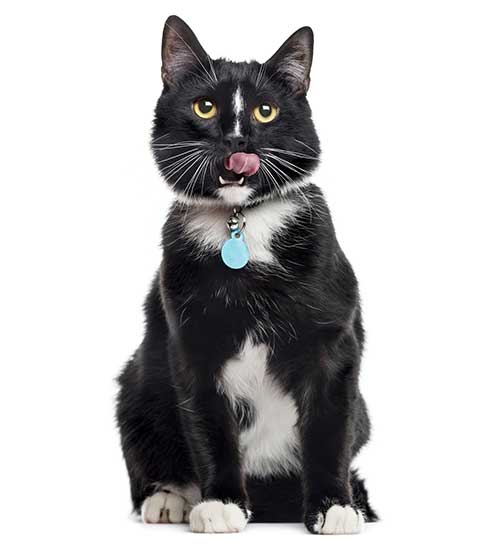
However, remember that the digestive system of your cat isn’t used to processing greens, and less so in large quantities. Therefore, the cat could develop a few gastrointestinal complications. Examples include diarrhea, vomiting, nausea, and abdominal pains.
Since the food isn’t toxic in any way, these symptoms should go away in a couple of minutes.
Monitor your cat carefully and observe how it recovers from these mild side effects. Using your best judgment, you’ll be able to determine whether you should visit your vet for further attention.
Bell peppers could also pose a choking hazard to your cat. This especially applies to kittens. While the fruit itself is soft and yummy, the plant isn’t very tender. Which brings us to the question, are bell pepper plants poisonous to cats?
Bell pepper plants may not carry any significant toxicity, but they’re reasonably tough to digest. Therefore, you shouldn’t allow the cat to nibble on these plants. Plus, bell pepper plants are bitter, and your cat will unlikely relish the taste.
What Kind Of Bell Pepper Is Ideal For Your Cat?
Bell peppers appear in four major color variants. These include green, yellow, orange, and red.
However, you could also find the fruit in various other pigmentations, such as purple, blue, pink, violet, maroon, brown, black, and even white.
Remember that regardless of the color, bell peppers originate from the same plant. The difference in these pigmentations depends on the time of harvesting and the degree of ripening.

All bell peppers begin green before they turn yellow or orange. At their most ripened state, the fruit is usually red.
The longer the pepper takes to mature, the scarcer and more expensive it is. That implies green bell peppers are the most abundant and the least costly. The red variants are the rarest and the most expensive.
Also, the sweetness of bell peppers increases as the fruit stays longer on the vine. That explains why red bell peppers are sweeter than their yellow and orange counterparts, with the green variants turning out to be the least tasty. So, can cats eat green bell pepper?
Yes, they can. However, they probably shouldn’t. Since green bell peppers are harvested pretty early, they lack significant nutrients that your feline friend could benefit from.
The only known crucial compound found in green bell peppers is lutein. However, it’s still not as abundant as it should, to bring about any meaningful benefits to your cat. And as we already mentioned, green bell peppers are also the least sweet.
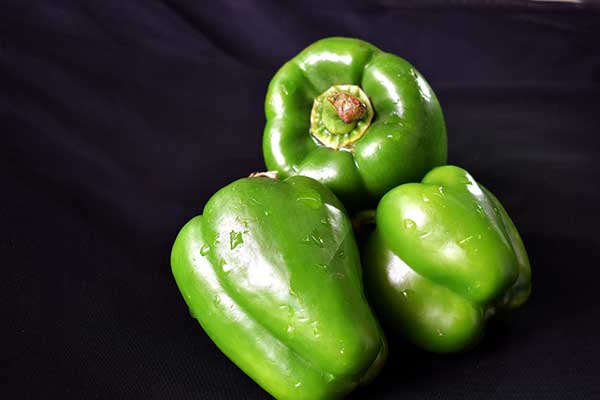
Unless your cat has a natural liking for green bell peppers, you should probably consider other color variants if you wish to treat the cat to a snack of bell peppers.
Your best bet would be the red bell peppers. Not only due to their delectable taste, but also because red bell peppers contain the highest number of nutritional elements you could ever find in bell peppers.
Studies suggest that red bell peppers might have over 11 times more beta-carotene and about twice as much vitamin C content, as compared to their green counterparts.
A notable mention is the antioxidant, capsanthin. Capsanthin can significantly help reduce the effects of free radicals within your cat’s body.
However, you should remember that red bell peppers have a shorter shelf life. Therefore, always buy portions that you can feed to your cat within a few days.
Also, it’s okay if the cat prefers yellow or orange varieties. Though not as nutritious as the red ones, they still pack substantial amounts of beta-carotene.
For instance, violaxanthin is a common carotenoid antioxidant found in yellow bell peppers. This antioxidant is nearly as effective as capsanthin.
Needless to mention, ensure you offer the fruit in moderation. You must also wash the fruit thoroughly prior to serving it to the cat.
The fruit should be fresh, not covered in dressings, spices, oils, or other foods considered harmful to cats. You can choose to serve bell peppers plain, or mix it into your cat’s regular food.
What If My Cat Has Eaten Some Bell Pepper?
As we already mentioned, it’s okay if your cat snacks on some bell pepper. But if you realize the cat has eaten the fruit behind your back, and in large quantities, you should understand the symptoms to watch out for.
Generally, expect mild gastrointestinal side effects that should vanish pretty soon. But if the symptoms persist beyond reasonable limits, take the cat to the vet immediately.
So, Can Cats Eat Bell Peppers?
As you may have gathered by now, cats can eat bell peppers, alright. The fruit isn’t toxic, and packs numerous nutritional elements your feline might enjoy.
Just ensure you offer the pepper plain and not dressed in any harmful ingredients. If you’d like, you can substitute bell pepper with any of these human foods considered safe for cats.

